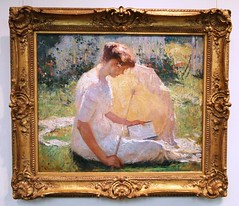 Image by pobrecito33 via Flickr
Image by pobrecito33 via FlickrAs a reader, do you like your stories to begin with a bang, or do you prefer a slow build-up, perhaps a question to be answered, some mystery introduced? As a writer, do you hook readers or do you tempt them, tease them with small tit-bits of information, make them so involved with your characters that they feel compelled to continue to read?
It's generally considered, by those who are supposed to know such things, that the best way to persuade a reader to travel through the first paragraph and beyond is to engage their interest. And, logically, that makes sense, of course. But it's the how of this that interests me. It comes down, I imagine, to the type of book you're reading or writing. The action book needs to grab the reader at once, posing some threat or challenge that must be faced and resolved by the hero. The love story requires that the reader cares about the heroine and is quickly engaged by her potential lover. The literary story can begin more slowly, more deliberately, with fascinating language and images presented in words well chosen. The crime novel employs the body in the library, or the detective about to embark on a new mystery.
So, this is a matter of horses for courses. I write in many genres and always try to engage the reader with the main character(s) as early as possible. I want readers to care what happens to the people in my stories. If I can introduce an air of menace, intrigue, mystery or simple desire, to fit the story, then I feel I've gone a long way to keeping the reader interested. Some writers, especially when they begin the craft, try to tell the reader too much in one go and drown the reader in facts, forgetting that they can be shown these things as the story unfolds.
So, I ask you; what do you prefer to read as an introduction to a new story? What's your approach as a writer to the beginning of a new tale? Please comment and let others know whether your response is as reader or writer.
Thank you.

6 comments:
It depends on the type of story, the mood of the writer and the mood of the reader. I sometimes like to begin at the end of the story, then have it unravelled. Other times I like to be introduced to the characters and the setting. It much depends on mood: What is the effect you want to induce in the reader? In a way quite a complex question with no simple answer.
Thanks for your observations, Ian. The reader's view is so helpful to writers. And your question is pertinent, thanks.
As a writer, a lot of things go into my openings. First, I plot out the story from climax backward until I hit a point where a reader can be introduced to the story, setting, and at least one character. Then I find some conflict related to the story in that scene.
That done, I show the character's response to that conflict.
The conflict doesn't have to be violent (Forex; in Fae Eye for the Golem Guy, a Romance, the introductory conflict is partially internal self-doubt and partially interpersonal sniping) , but the character is generally fairly important to the story in some way.
Always, always, always I try to make sure the prose is pleasing. I'm afraid my personal tastes run a bit too much to alliteration, but I do still try to make sure the opening is pleasant to read on top of everything I've already said.
So I guess it's something of a 1-2-3 combo for me.
Thanks for you contribution, Robert. An interesting method and one that obviously works for you.
Good topic...I've started stories a few different ways but my favorite is to start in the middle with flashbacks to the beginning. I am working on an autobiographical fiction novel now similar to James Frey's A Million Tiny Pieces and it just seems kinda boring to start with, "I was born in xyz city...etc." 2 Questions should I bill it as autobiographical fiction or as my memoir and if as my memoir should I publish under a pseudonym to protect family members? Also how much of my story can I or should I risk posting on line if I want to publish this story eventually? Thanks for your help.
Hi Jessica. I think I'd tackle the start with something unusual or startling and then work backwards/forwards from there, with flashback etc, as required.
I think you have to bill this as autobiographical fiction, as memoirs are generally seen as being 'true' stories.
Regarding the effects of online publishing on an eventual publishing contract; that really depends on the individual publisher. The copyright remains yours, so if you self-publish it won't be an issue. A traditional publisher, however, may view previous exposure of too much of the book as a handicap but a small amount as useful marketing material.
Post a Comment